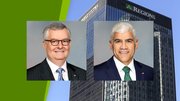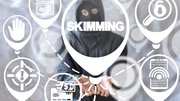News
NCR's fortunes improve under CEO Hurd
June 13, 2004
DAYTON, Ohio - It may be too early to tell, but it looks as if Mark Hurd may earn the title of "turnaround artist" after only about a year as NCR's president and chief executive.
When he took over in March 2003, NCR stock was selling at $18.11 a share. According to the Associated Press, the stock closed at $48.90 on June 10; the market was closed on June 11.
In the fall of 2002, Hurd and other NCR executives produced a plan designed to improve the company's financial performance that focused on cost cutting rather than new revenues.
"At that point in time, we didn't bet on the economy," Hurd told the AP. "So we really went about the job of trying to fix ourselves from the inside out. There's been a lot of hard work that's caused pain in parts of the company."
The company laid off 1,500 workers, including 200 at its Dayton headquarters, saving $100 million in 2003. NCR currently employs 28,900 workers, down from 33,000 in 2001.
"We had a cost structure that I felt was not as competitive as it needed to be," Hurd said. "We're still not finished with it."
Hurd said the cost-cutting is not over, although he would not say whether more layoffs may be coming. The "gap" from where the company was to where it wants to be is much smaller, he told the AP.
"We will always be working to improve our efficiency. We're trying to get the company sized right," he said.
Hurd's other goal is growing the business. In 2004's first quarter, revenue increased to $1.29 billion, up from $1.23 billion the previous year. And revenue grew by 10 percent in NCR's three biggest product divisions -- ATMs, checkout scanners and data warehouses.
NCR's ATM and checkout-scanner businesses are benefiting from consumers' increasing acceptance of self-service, Hurd told the AP. "We're going to have more and more self-service, not less."
He said NCR currently holds about 35 percent of the worldwide ATM market.
Hurd said NCR has a "good track to run on" with its data warehouses, which can be used by everyone from pharmacies to cell phone companies to develop customer profiles, improve service and boost their competitive position. About one-third of the world's largest 3,000 companies have NCR data warehouses, he said.
"We've got a big ticket to the game," he said. "Data is exploding for 100,000 reasons."
Born in New York City, Hurd attended Baylor University in Texas on a tennis scholarship and rose to be the school's No. 1 player. He graduated with a business degree and after an attempt at professional tennis, joined NCR in 1980 selling computers in the Austin-San Antonio area.
He rose through the NCR ranks to head the company's data warehouse division in 1999, increasing its revenue by 36 percent.
 ChatGPT
ChatGPT Grok
Grok Perplexity
Perplexity Claude
Claude












